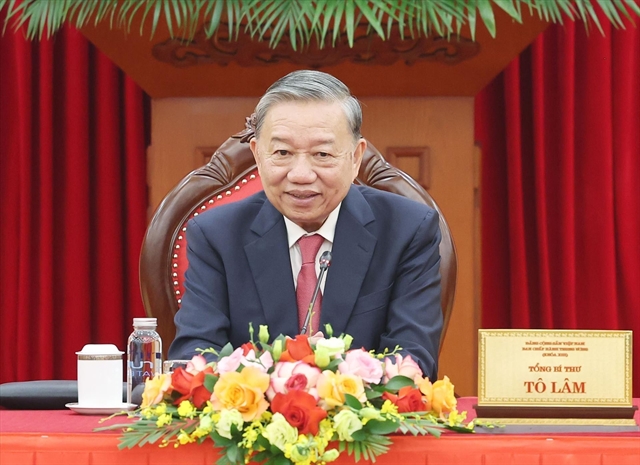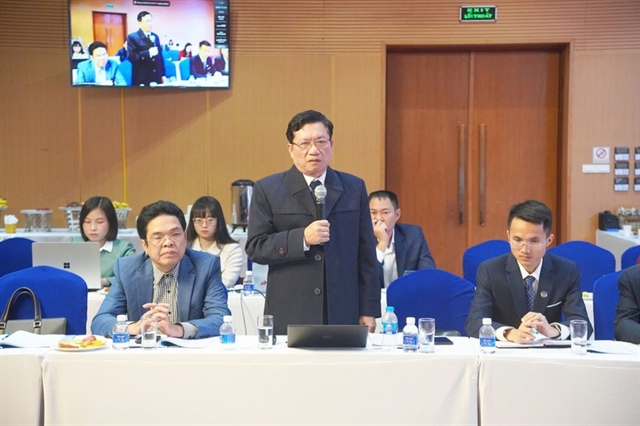 Politics & Law
Politics & Law


|
| Experts at the forum said that workers are a key factor in ensuring the quality of legal aid. — VGP/VNA Photo |
HÀ NỘI — Legal aid activities have achieved positive results in recent years, including an increase in the number of cases and recognition of the role of legal aid providers in civil, criminal and administrative proceedings and documents.
Vũ Thị Hường, deputy director of the Department of Law Dissemination, Education and Legal Aid under the Ministry of Justice (MoJ), made the statement at a forum titled 'Strengthening resources for legal aid for vulnerable groups'.
The event was held on Wednesday by the department in cooperation with the Democracy and Law Journal.
Passed in 2017 and taking effect in 2018, the current Legal Aid Law has yielded many positive outcomes, but also exposed several weaknesses that need amendment or supplementation.
This is why the MoJ this year proposed amending the law, which the National Assembly decided to include in the Legal Framework Building Programme for next year.
With practical experience in assisting the vulnerable, lawyer Nguyễn Hữu Tiến Anh, CEO of the Phúc Khánh Law Company, argues that resources for legal aid remain weak, especially at the grassroots level.
Many legal aid officers juggle multiple tasks and have not undergone in-depth training, while public demand continues to rise.
In Phú Thọ Province, on average each State Legal Aid Centre employs about 10–15 legal aid staff handling hundreds of cases per year.
From 2020 until 2024, more than 5,600 legal aid cases were processed in the province, of which 65 per cent were criminal cases.
Along with the shortage of personnel, legal aid workers also face constraints in funding, facilities and the use of technology.
Coordination mechanisms between prosecutorial bodies, mass organisations and related agencies are sometimes not fully aligned, causing delays in access to and provision of support for the vulnerable. There is also a lack of feedback mechanisms allowing citizens to evaluate the quality of legal services.
Expanding scope
Hoàng Trọng Nghĩa, deputy director of the State Legal Aid Centre 1 in Bắc Ninh Province, said that through efforts to provide legal aid to people with disabilities, the centre has regularly conducted outreach activities to villages and commune-level people's committees so that people with disabilities can understand their rights under legal provisions and the Legal Aid Law.
However, several challenges persist. Financial constraints are often faced by people with disabilities, the scope of legal aid outreach activities is often limited and problems with coordination between prosecutorial bodies and related agencies can impede access to and the delivery of legal aid.
Nghĩa has therefore proposed expanding the eligibility for legal aid to all people with disabilities, as well as removing inconsistencies around disability status to ensure that vulnerable groups can access free legal services, protecting their rights and lawful interests to the greatest extent.
He suggested strengthening and accelerating legal aid communication to people with disabilities and to the broader community along with agencies, organisations and individuals, and enhancing the responsibility of prosecutorial and investigative bodies and other related entities in handling cases for people with disabilities.
To boost resources for legal aid to the vulnerable, lawyer Đào Ngọc Chuyền, deputy chairman of the Việt Nam Bar Federation, suggested expanding the eligible group for legal aid, resolving overlapping regulations related to disabilities and human trafficking victims.
He wanted to refine the rule on how legal aid is coordinated within procedural activities, including explaining the right to legal aid to suspects and those under indictment, and continue to improve legal aid policies within national target programmes.
Based on the demand for legal aid, each province should also clearly determine the number of people involved in legal aid work, especially legal aid officers, and develop planning and recruit staff to create a pool for appointing legal aid officers.
Localities should also increase the quantity and capacity of the team implementing legal aid and simultaneously enhance training, professional development and advocacy skills for legal aid officers and those delivering legal aid.
Legal aid officers should also be required to participate in at least eight hours of professional training per year.
Other proposed rules include encouraging social workers to participate in legal aid activities, especially experienced practicing lawyers and organising conferences to train skills in applying information technology to monitor, appraise and evaluate the quality and effectiveness of legal aid.
Supporting local capacity-building for grassroots staff to build effective online access to legal information via the internet, VNeID and other information technology applications will also be necessary. — VNS